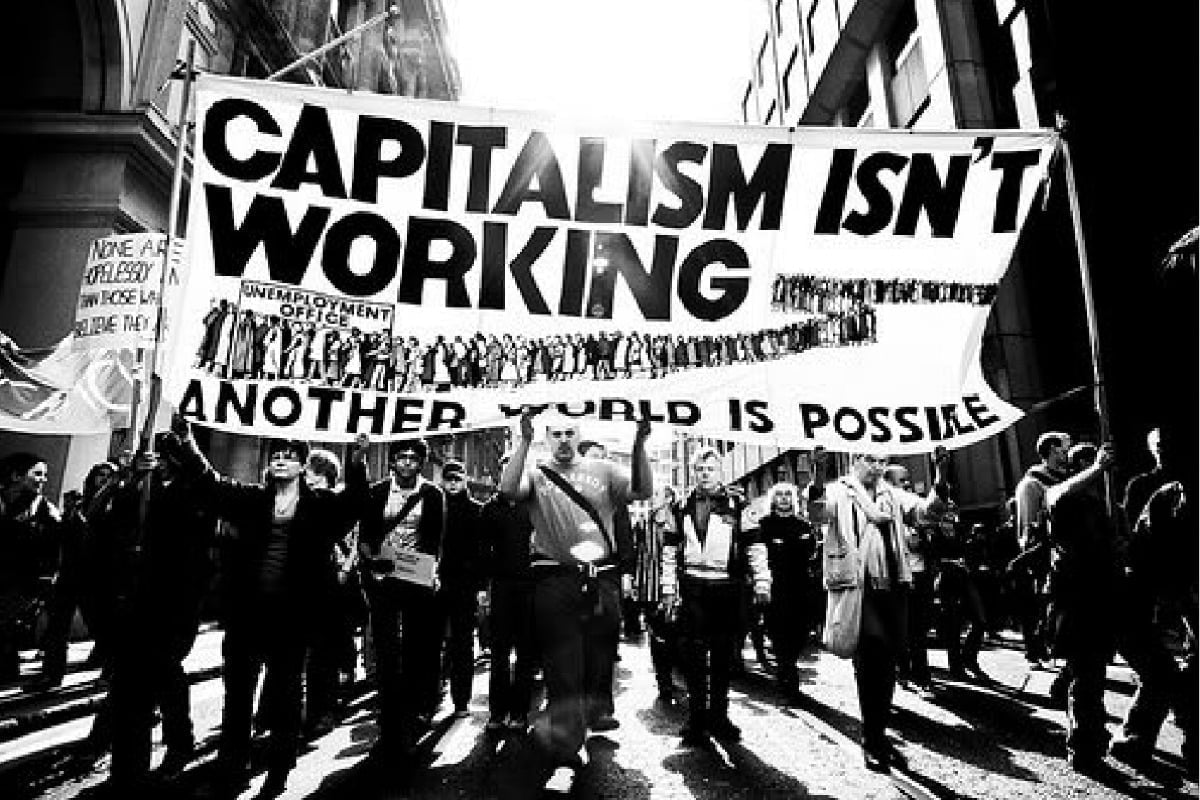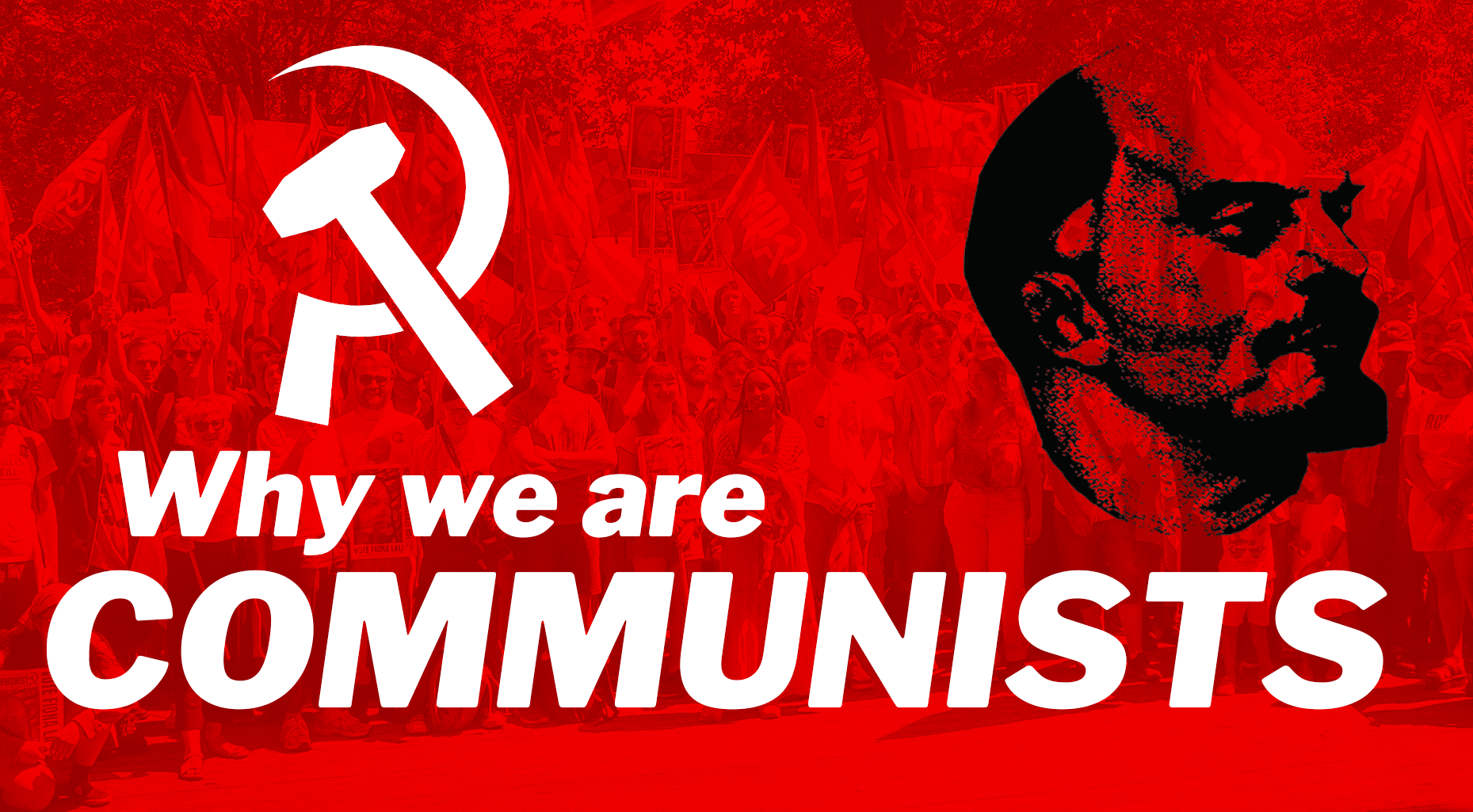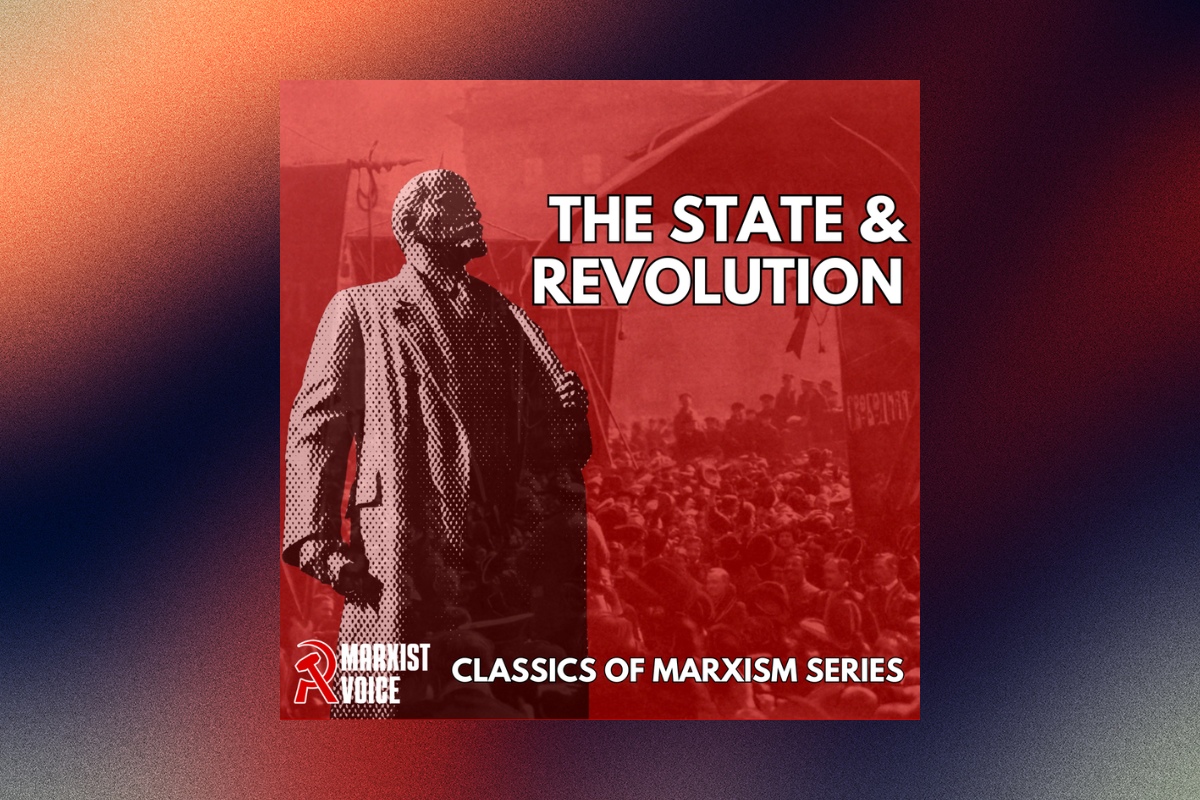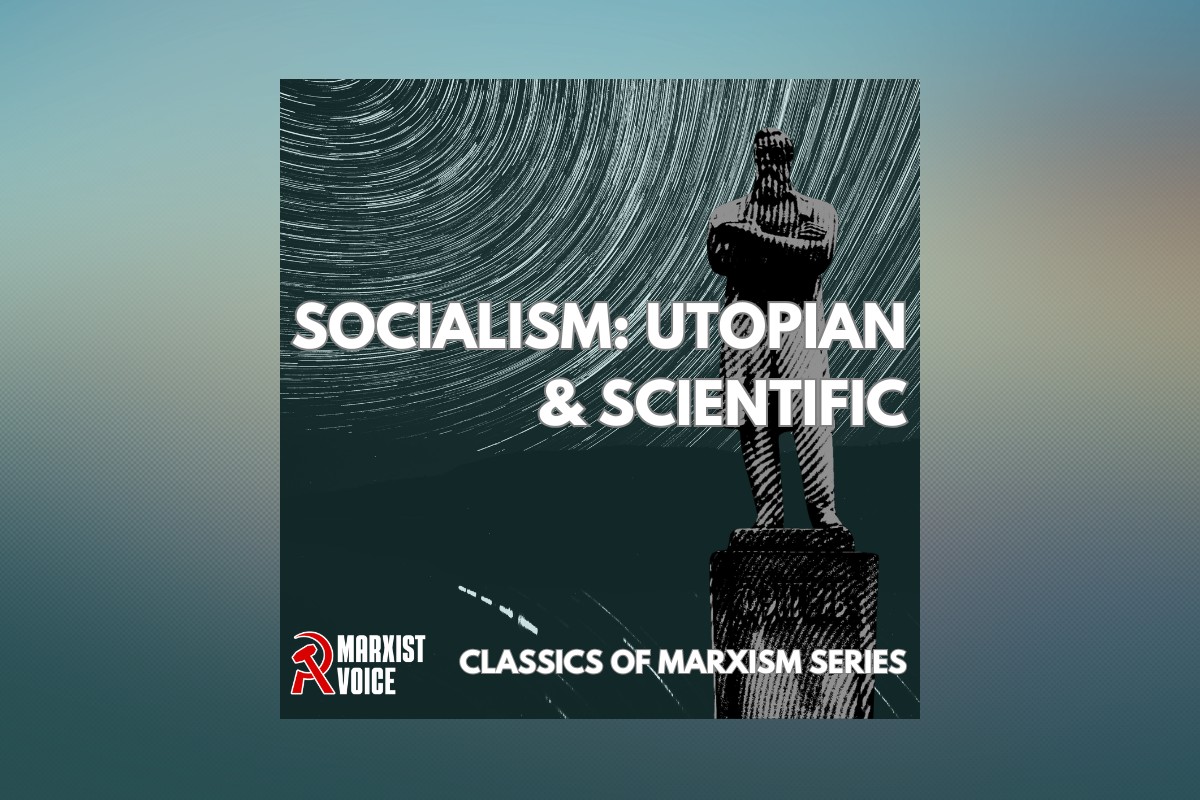The middle of a global pandemic, with a deep economic depression looming, might seem an odd time to think about what a socialist society could look like. But for Marxists, such a time is precisely the moment at which the need – and potential – for socialism becomes most glaringly obvious.
It is in such dramatic events that one sees the concrete expression of what Marx meant by “the conflict existing between the social forces of production and the relations of production”. (Karl Marx, Preface to a Contribution to a Critique of Political Economy)
Across the world, as a result of this crisis, hundreds of millions are predicted to starve. Billions are to lose their livelihoods. In the words of the Communist Manifesto, “society suddenly finds itself put back into a state of momentary barbarism”.
“And why?” Marx and Engels continue in the Manifesto. “Because there is too much civilisation, too much means of subsistence, too much industry, too much commerce.”
“The productive forces at the disposal of society no longer tend to further the development of the conditions of bourgeois property; on the contrary, they have become too powerful for these conditions, by which they are fettered, and so soon as they overcome these fetters, they bring disorder into the whole of bourgeois society, endanger the existence of bourgeois property. The conditions of bourgeois society are too narrow to comprise the wealth created by them.”
(Marx and Engels, The Communist Manifesto)
In other words, capitalism’s crises are not crises of genuine scarcity, but are the result of our productive capacity hitting up against the limits of the market. They are crises, as Marx explained, of overproduction.
The current crisis is no exception. At the time of writing, the global economy is emerging from its hibernation; from the state of suspended animation achieved in the past few months thanks to trillions in government spending and support.
But even when (if) the lockdown is fully lifted and social distancing subsides, many businesses will not reopen. Mass unemployment will be the new norm, as in the 1930s. Millions upon millions will struggle to make ends meet. And yet, as a society, we have the means – as has been the case for many decades – to feed the entire world’s population, and more. So why such poverty amidst plenty?
The reason for this contradiction is entirely due to the barrier of capitalist social relations – that is, private ownership, competition, and production for profit.
We have the ‘productive forces’ – the technology, industry, and science – to provide all of life’s necessities in abundance; and to avert the climate catastrophe at the same time. The problem is that capitalism does not operate according to needs, but only in order to accumulate profits.
As Marx summarised in his Critique:
“Mankind thus inevitably sets itself only such tasks as it is able to solve, since closer examination will always show that the problem itself arises only when the material conditions for its solution are already present or at least in the course of formation.”
Socialism: Utopian and Scientific
This – the existence of the material conditions for a new, higher form of society – is the general theme of a number of recent popular books on contemporary economics and technology, all published by Verso: Fully Automated Luxury Communism (Aaron Bastani, 2019); The People’s Republic of Walmart (Leigh Phillips & Michal Rozworski, 2019); and Capital is Dead (McKenzie Wark, 2019).
All three of these look at how the development of capitalism has paved the way for a future socialist society. Now, two decades into the 21st century, we have the technologies and techniques needed to organise production internationally; to provide clean energy and sustainable, nutritious food to all; and all whilst reducing the hours of the working week by half – or more.
As Marx and Engels emphasised, these are the material conditions required for a genuinely socialist (and democratic) society: a society devoid of class antagonisms, oppression, or money relations, based on the motto “from each according to their abilities; to each according to their needs”. (Karl Marx, Critique of the Gotha Programme)
In contrast to their utopian socialist predecessors – figures like Robert Owen, Charles Fourier, and Henri de Saint Simon – Marx and Engels explained that socialism (and its higher stage, communism), could not be achieved simply through blueprints or ‘men of genius’.
In this sense, they defined their ideas as those of ‘scientific socialism’: a materialist perspective that socialism requires certain historical-economic conditions – primarily, conditions of ‘superabundance’ – in order to be possible.
“A development of the productive forces is the absolutely necessary practical premise [of communism],” the same authors note in the German Ideology, “because without it want is generalised, and with want the struggle for necessities begins again, and that means that all the old crap must revive.” (Marx and Engels, the German Ideology; paraphrased by Leon Trotsky in the Revolution Betrayed)
It is this idea that these Verso publications explore, demonstrating (on the one side) concretely how we now have the necessary ‘forces of production’ for a socialist society; but also (on the other side), how under capitalism, these same productive forces lead not to the liberation of humanity, but to the opposite: to brutal exploitation, environmental destruction, and economic anarchy.
Fully Automated Luxury Communism
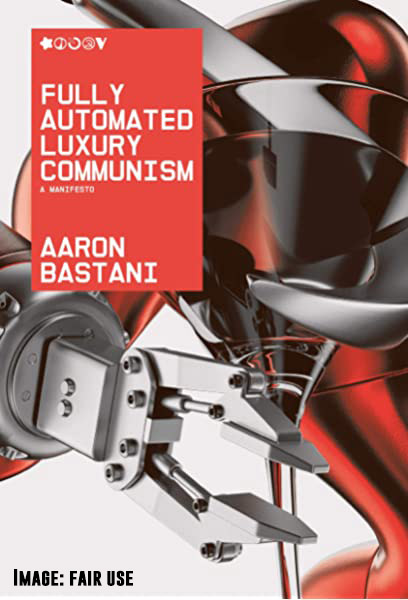 As the title suggests, Bastani’s Fully Automated Luxury Communism (from here on referred to as FALC) is the most explicit in addressing this motif.
As the title suggests, Bastani’s Fully Automated Luxury Communism (from here on referred to as FALC) is the most explicit in addressing this motif.
Drawing on similar ideas from other recent books, such as Paul Mason’s PostCapitalism, FALC discusses how society is undergoing a third great technological ‘disruption’. The first was the Neolithic Revolution, which established farming in place of nomadic hunting and gathering. The second was the Industrial Revolution, based on steam power, fossil fuels, and factories.
The third disruption, Bastani asserts, is already underway, based on silicon chips, digital information, and artificial intelligence. This, the author says, provides the potential for exponential improvements in productivity; for a future of “post-scarcity”; and thus for a new society of “fully automated luxury communism”.
After introducing his initial premise, Bastani spends the majority of the book examining the progress and possibilities in different key sectors of the economy: automation; energy; resources; healthcare; and food. He then returns at the end to the $64 trillion question – how do we realise all of this potential and reach our FALC destination?
Unfortunately, however, it is in the leap between these two levels of discussion that Bastani stumbles.
On the one hand, for example, the sections outlining the incredible advances in modern technology at times read more like a copy of New Scientist, and less like a serious piece of political economy; more sci-fi socialism than scientific socialism.
What is missing, in this respect, is a deeper explanation of the relationship between technology, economics, and politics.
In his magnum opus Capital and other writings, Marx explained that no technology is ever intrinsically ‘good’ or ‘bad’. The same technology can be realised in very different ways, depending on the socio-economic system that it operates under.
For example, under capitalism, Marx noted, the worker “becomes an appendage of the machine”. Automation leads to the contradiction of mass unemployment for some, alongside intense overwork for others. Under socialism, by contrast, the fruits of increased productivity would be shared across the whole of society. Machinery would be used to lower the hours of the working day for all, for example, without any loss of pay.
Ultimately, this is a class question of who owns and controls technology; that is, which class – the capitalists or the workers – owns the means of production, and in whose interests these technologies are employed.
Bastani does touch on these questions in his concluding chapters, correctly stating that “how technology is created and used, and to whose advantage, depends on the political, ethical and social contexts from which it emerges.” But he then gropes around blindly in the dark, unable to chart a path from where we are now, to where we need to get to.
The FALC author is best known for his role as founder and senior editor of trendy left-wing website Novara Media. But it is the desire to maintain this trendy appearance that leads the author into a quagmire, as he struggles to provide a bridge between the ‘minimum’ and the ‘maximum’ demands – between reforms and revolution.
To his credit, he correctly calls for proposals such as ‘universal basic services’, instead of a ‘universal basic income’ (still, why does everything have to be ‘basic’?).
But these positive suggestions are lost within a morass of reformist, Keynesian ideas, such as the so-called ‘Preston Model’ (which Bastani refers to as “municipal protectionism”); abstract cries to “break with neoliberalism” (as though there were a ‘nicer’ form of capitalism); and vague demands for a “state-transition to renewable energy”.
This final point highlights the real limits of Bastani and other similar authors. They want to sound radical (ticking off all the compulsory name-drops like Mark Fisher early on). But key questions – like the nature of the state – are purposefully left obscured and unanswered.
We must concretely ask: what kind of state is to carry through this “transition”? A capitalist state, or a socialist (workers’) state? And if it is to be the latter, how do we organise and fight to overthrow the former?
In the absence of an answer to these vital questions, we are plunged back into the realm of utopian socialism – of ‘FALC’ simply as a ‘nice idea’; an aspirational ‘blueprint’, divorced from the material realities of capitalism and its necessary overthrow.
The People’s Republic of Walmart
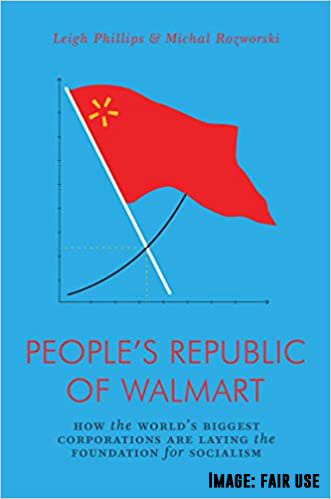 A similar premise – that the potential for socialism can be seen within modern capitalism – is also explored in an interesting recent release entitled The People’s Republic of Walmart (PRW). But whereas FALC focuses on technologies, PRW examines techniques – or, more specifically, the question of economic planning.
A similar premise – that the potential for socialism can be seen within modern capitalism – is also explored in an interesting recent release entitled The People’s Republic of Walmart (PRW). But whereas FALC focuses on technologies, PRW examines techniques – or, more specifically, the question of economic planning.
The book, written by two regular contributors to US-based left-wing journal Jacobin, takes its wry title from a related pair of astute observations. Firstly, that giant multinational corporations (such as Walmart) deploy an extraordinary level of planning in the process of producing and distributing the goods that they provide. And, secondly, that the size of their yearly revenues is comparable to the entire annual output of formerly-planned economies, such as the old Soviet Union.
In other words, if Walmart was a country, and not a company, it could well be considered a successful example of economic planning.
“While the company operates within the market,” the authors comment, referring to the American supermarket giant, “internally, as in any other firm, everything is planned”.
“There is no internal market. The different departments, stores, trucks and suppliers do not compete against each other in a market; everything is coordinated. Walmart is not merely a planned economy, but a planned economy on the scale of the USSR smack in the middle of the Cold War.”
In essence, this is a direct echo of the pertinent point made by Marx and Engels over 150 years ago: that under capitalism, we see an enormous contradiction of incredible levels of planning within firms, alongside complete anarchy between firms in the market.
As Engels eloquently explains, this is ultimately the contradiction between socialised production and private appropriation; between an immensely interconnected world economy and the barrier of private ownership over the means of production.
“The contradiction between socialised production and capitalistic appropriation now presents itself as an antagonism between the organisation of production in the individual workshop and the anarchy of production in society generally.”
(Friedrich Engels, Socialism: Utopian and Scientific, emphasis in the original)
PRW goes further in reiterating Marx and Engels, explaining that this contradiction ultimately leads to economic crises. As Engels continues:
“In these crises, the contradiction between socialised production and capitalist appropriation ends in a violent explosion…All the laws of production and circulation of commodities are turned upside down. The economic collision has reached its apogee. The mode of production is in rebellion against the mode of exchange.”
(ibid, emphasis in the original)
Free market vs socialist planning
The whole book, therefore, is a searing attack on the free market fanatics who arrogantly extol the virtues of the ‘invisible hand’. It is also an enjoyable read: clear and concise in its writing; able to dodge the pitfalls of Bastani’s muddled musings and nebulous utopianism.
Using a wide-range of examples – from Amazon’s logistics network, to modern monopolised finance, to the space race – Phillips and Rozworski provide irrefutable evidence that the capitalist market and profit system are far from ‘efficient’.
Indeed, by taking the reader on this tour de force, PRW’s authors show that even the capitalists tacitly acknowledge the superiority and advantages of economic planning.
But again emulating Marx, they also highlight the hypocrisy of capitalism’s apologists. What we see today is not ‘liberation’ and ‘freedom’, but “islands of tyranny”, the book correctly states.
“The market economy is not only rife with planning,” the Jacobin writers note, “but with authoritarian planning that concentrates economic decision making in the hands of wealth owners and keeps workers in line.”
“Among the paeans to freedom and to the spontaneous efficiency of markets, few words even graze the everyday planning that goes on within the four walls of the firm. Fewer, still, name it as coercive.”
In the same respect, Phillips and Rozworski rightly emphasise that a genuinely socialist economy must be free of tyranny and authoritarianism. This, the authors explain, is not simply a moral question, but one of necessity. Top-down, bureaucratic planning cannot – and does not – work.
This is a central point that the book highlights throughout its various chapters. For example, PRW regularly returns to the question of the “Socialist Calculation Debate”: an ongoing polemic between economists of the left and the right as to whether the economy can truly be planned.
Libertarian thinkers, such as von Mises and Hayek of the ‘Austrian school’, denied that socialism was possible, for the simple reason that the modern capitalist economy is unfathomably complex. No machine or government department, they believed, could ever allocate resources as effectively as the price signals provided by market forces.
On the one side, PRW’s authors explain, the impressive logistical operations and global supply chains operated by today’s monopolies and multinationals bring the Austrian assertion into question.
On the other side, they stress, socialism is not about ‘calculating’ the needs of society through equations, by bureaucrats or computer algorithms. It is about ordinary people having control over the economy – and thus over their lives – through a system of workers’ democracy, control, and management.
“We shouldn’t suggest planning is simply a matter of ‘taking over the machine’,” the book’s final passage underlines, “still less ‘the government’ taking it over and otherwise leaving the machine as it is.”
“It is not simply a world that must be taken over but one that must be transformed.”
This key point is elucidated clearly in the book through the use of two historical examples. Firstly, the NHS and the postwar economy in Britain, where reformist politicians attempted to use the levers of the bourgeois state to ‘manage capitalism’.
Just as the planning seen in Walmart and Amazon does not benefit workers, Phillips and Rozworski explain, so too these Keynesian experiments show how “simply placing planning in the hands of the state is likewise insufficient”.
Similarly, the authors dedicate a whole chapter to the elephant in the room: the Soviet Union. By outlining the history of the USSR – from the revolution and war communism, through to the bureaucratic planning of Stalin, Khrushchev, Brezhnev, and Gorbachev – PRW shows why genuine socialism requires the active participation of the organised working class.
“To be clear: a non-market economy is not a question of unaccountable central planners, or equally unaccountable programmers or their algorithms making the decisions for the rest of us,” PRW emphatically concludes.
“Without democratic input from consumers and producers, the daily experience of the millions of living participants in the economy, planning cannot work. Democracy is not some abstract ideal tacked on to all this, but essential to the process.”
As the penultimate chapter highlights, this issue is not of mere historical or academic interest. Rather, it is an existential question.
The chaos of the capitalist market is killing the planet. Planning production and the planet’s resources – in a socialist, rational, and democratic way – is the only alternative to climate catastrophe. Likewise, it is the only way to fight the coronavirus pandemic.
Harmonious socialist planning or capitalism’s anarchic destruction. This is the stark choice facing humanity – a matter of life or death.
Capital is Dead
 The third in this literary trilogy is McKenzie Wark’s Capital is Dead. The central conceit of Wark’s latest work (flowing directly from her earlier book, A Hacker Manifesto) is that the information age – Bastani’s so-called “third disruption” – has led to a “new mode of production”.
The third in this literary trilogy is McKenzie Wark’s Capital is Dead. The central conceit of Wark’s latest work (flowing directly from her earlier book, A Hacker Manifesto) is that the information age – Bastani’s so-called “third disruption” – has led to a “new mode of production”.
“This is not capitalism anymore; it is something worse,” Wark conjectures. These new economic relations, the author postulates, consist of an “emerging ruling class” based on “ownership and control of the vector of information” and “the extraction of what you might call surplus information, out of individual workers and consumers” (Wark’s emphasis).
“There’s a whole political economy that runs on asymmetries of information as a form of control”, the author muses. “It may even amount to a new kind of class relation.”
“Sure, there is still a landlord class that owns the land under our feet and a capitalist class that owns the factories, but maybe now there’s another kind of ruling class as well – one that owns neither of those things but instead owns the vector along which information is gathered and used.”
But such a hypothesis is not based on anything other than speculation. It is not scientific socialism, nor even utopian socialism. Rather, it is a pointless academic exercise on the part of the author; mere navel-gazing reverie (as Wark herself even admits).
The main justification behind Wark’s suggestion is the key role played by data and information technology in the modern global economy. The rise of an information-based economy, the author proposes, has resulted in the development of a whole new mode of production.
“These technologies made information very, very cheap and very, very abundant,” the author states. “They gave rise to a strange kind of political economy, one based not only on a scarcity of things but also on an excess of information.”
“This generated quite novel kinds of problems for those who had (or aspired to) power: how to maintain forms of class inequality, oppression, domination, and exploitation, based on something that in principle is now ridiculously abundant.
“My proposition in this book is that resolving this contradiction called into being a new mode of production…The dominant ruling class of our time no longer maintains its rule through ownership of the means of production as capitalists do. Nor through ownership of the land as landlords do. The dominant ruling class of our time owns and controls information.”
Wark ties herself in knots over this question, but for no reason other than to entertain her own pointless philosophical ruminations.
Firstly, she is incorrect to say that we have an economy based on a ‘scarcity of things’. Indeed, given the developments of production over the last two hundred years, we live in a world of ‘superabundance’. It is capitalism – based on production for profit – that artificially generates scarcity where there need not be.
Secondly, the glaring contradictions created by the ‘excess’ of any commodity – whether it be digital or physical or otherwise – do not require us to dream up whole new modes of production. Rather, they highlight the impasse of the capitalist system, which can no longer utilise the technological, scientific, and productive potential that exists.
Monopoly capitalism
 These contradictions are real. But Wark is not the first to notice them. They are a reflection of the same processes that we have discussed above and elsewhere: that the laws of the capitalist market break down in the face of abundance and plenty; and that the profit system, in this scenario, can only be maintained by transforming free competition into its opposite – monopoly.
These contradictions are real. But Wark is not the first to notice them. They are a reflection of the same processes that we have discussed above and elsewhere: that the laws of the capitalist market break down in the face of abundance and plenty; and that the profit system, in this scenario, can only be maintained by transforming free competition into its opposite – monopoly.
This is the answer to the supposed riddle of information that Wark identifies. The plethora of data whizzing around silicon-based processors and fibre optic cables has not given rise to any “new forms of exploitation, inequality, and asymmetry”, as the author suggests.
Rather, the capitalists today employ a very old form of exploitation: that of rent seeking, based on their monopolistic ownership and control over the means of production – in this case, the big tech companies and their ‘platforms’.
For sure, as Marx explained, the labour theory of value shows that commodities which contain less socially necessary labour time are less valuable. In the case of data and digital goods, which are infinitely replicable, this means that the value should tend towards zero.
Even the bourgeois detractors of Marxism are forced to acknowledge this, with their assertion that the price of a commodity should equal the ‘marginal cost’. For digital commodities that can be reproduced ad infinitem at almost no additional cost, this means that the price should effectively be nothing.
And this does pose a problem for a market-based economy. After all, if things have no value, then they can contain no surplus value. And it is surplus value that is the source of the capitalists’ profits.
In other words, as productivity tends towards infinity, value and profits tend towards zero. But production, under capitalism, is only for profit. Therefore superabundance – as exemplified by digital goods and information – is incompatible with the principles of the capitalist market and profit system. This is a genuine contradiction, which Wark hints at.
But this law of value is not written into the fabric of the universe. Rather, it is a dynamic that arises out of exchange, assuming the fair and free movement of commodities and capital.
The real world, however, is more complex. We do not have a free market. Instead, capitalism for over a century now has been dominated by monopolies. The presence of these monopolies distorts the market, restricting supply and causing prices to diverge from values. And this is what allows the modern tech monopolies to generate their super-profits.
This profiteering (from charging prices in excess of values) is what is referred to as ‘rent seeking’. Far from representing a ‘new mode of production’, it has existed since the dawn of capitalism.
This is no different from the oil barons of the Gilded Age, who gained their enormous wealth through their monopoly ownership over land rich in ‘black gold’. Only today, this monopoly ownership comes in the form of intellectual property rights, patents on software and computer code, and control over vast swathes of the online world.
Wark even acknowledges that this is what is taking place. But for some reason she feels compelled to give this very old phenomena a new name – presumably in order to scratch her academic itch; because of a desire to present ‘novelty’ against the ‘dogma’ of Marxism; and ultimately to justify her career writing such tedious drivel in the first place.
And so we are introduced to the “vectoralist class” that “owns and controls patents, which preserve monopolies on these technologies”. So apparently Jeff Bezos and Mark Zuckerberg are not capitalists, but “vectoralists”! What is gained by such re-categorisation of the Silicon Valley bosses, however, is anyone’s guess.
Hackers vs workers
There is another side to this question, which also explains why Wark is so keen to push her frivolous theory. And that is the question of who is being exploited – and how – in the digital realm.
Alongside the exploiting “vectoralist class”, we are told that there now exists an exploited “hacker class” – “everyone who produces new information out of old information, and not just people who code for a living.” And Wark, conveniently, already has another book outlining a manifesto for this new exploited class!
But this concept of a “hacker class” is just a regurgitation of an idea that has been circulating for some years: that we as internet users are in fact ‘data workers’, exploited by Google, Facebook, et al. for the information we create in the process of our online activity. This ‘commodity’ of data, so the reasoning goes, is then sold by the big tech firms, enabling them to generate their massive profits.
As we have explained elsewhere, however, this perspective fundamentally misunderstands where the profits of the tech giants come from. The wealth of Zuckerberg and co. does not come from ‘exploiting’ Facebook users, but a) from the genuine exploitation of the highly-skilled labour of programmers and software engineers working at Facebook, etc.; and b) from the monopolistic position established by these platforms as spaces for advertising.
In effect, the big tech monopolies are like the landlords who own the land by the side of roads, upon which billboards are erected. Or the media moguls who charge for other businesses to advertise in their pages. Or the television and radio bosses who hire out time on the airwaves. Only now, with marketing increasingly moving online, it is firms like Google and Facebook that have the power to dictate the rates charged to advertise on their terrain.
“In 2001, when Google was a startup and Mark Zuckerberg in high school, digital advertising made up 5% of America’s ad mix,” notes a recent article in the Economist about the advertising industry. Now, the magazine highlights, that fraction is around 50%, and is forecast to reach almost 70% within the next few years.
“Meanwhile, everyone is at the mercy of a near-duopoly,” the same article continues. “Two landlords, Google and Facebook, control 60% of worldwide digital-ad real estate.”
So there is no need to invent whole new modes of production – with new categories of exploiters (“vectoralists”) and exploited (“hackers”) – in order to explain what is taking place in front of us. It is the same old monopoly capitalism as has existed for over 100 years: with the bosses exploiting workers and utilising their dominant position to extract ever more wealth from society via rent seeking.
Era of revolution

As Marx so brilliantly explained in his Critique:
“At a certain stage of development, the material productive forces of society come into conflict with the existing relations of production or – this merely expresses the same thing in legal terms – with the property relations within the framework of which they have operated hitherto. From forms of development of the productive forces these relations turn into their fetters. Then begins an era of social revolution.”
Capital isn’t dead – not yet. But the senile capitalist system is dying. And it must be actively and consciously terminated.
At the same time, a new society is maturing in the womb of the old. And the crises we see around us are the birth pangs of this embryonic society trying to be born.
Revolution is the midwife of history; the only way of easing these birthing pains. But this requires organisation and struggle. We must equip ourselves with the scientific ideas of Marxism – the only tools that can help deliver a socialist future into this world.
All three books reviewed in this article are available from Verso Books:
Fully Automated Luxury Communism by Aaron Bastani
The People’s Republic of Walmart by Leigh Phillips & Michal Rozworski

